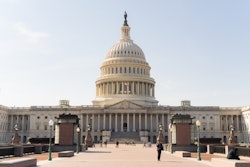The U.S. Department of Education announced Monday a massive $1.16 billion i Education Secretary Linda McMahon
Education Secretary Linda McMahon
The new funding package includes $500 million for charter schools—the largest investment ever in the Charter Schools Program—alongside $495 million for Historically Black Colleges and Universities (HBCUs) and Tribally Controlled Colleges and Universities (TCCUs), and more than $160 million for American history and civics education programs.
"Today, the Department is making three massive investments—redirecting financial support away from ineffective and discriminatory programs toward those which support student success," said Education Secretary Linda McMahon in a statement announcing the funding.
The investments come days after the department announced it would end discretionary grant funding to several minority-serving institution programs, including Hispanic-Serving Institutions, Predominantly Black Institutions, and Asian American and Native American Pacific Islander-Serving Institutions. That decision, which affects approximately $350 million in fiscal year 2025 funding, has drawn fierce criticism from college leaders and Democratic lawmakers who argue it will harm students at institutions serving large populations of underrepresented minorities.
The timing of the announcements has raised questions about the administration's approach to educational equity. While HBCUs and TCCUs are receiving significant increases—48.4% and 109.3% respectively—other minority-serving institutions are losing critical federal support that advocates say has helped narrow educational disparities.
McMahon defended the department's approach, saying the administration "has carefully scrutinized our federal grants, ensuring that taxpayers are not funding racially discriminatory programs but those programs which promote merit and excellence in education."
The cuts to MSI programs stem from the administration's view that institutions requiring certain percentages of minority students to qualify for grants violate equal protection principles. For example, Hispanic-Serving Institutions must enroll at least 25% Hispanic students to qualify for federal designation and related grants.
However, HBCUs and TCCUs are structured differently. Their federal designations are based on historical mission rather than current enrollment demographics. HBCUs must have been established before 1964 with a principal mission of educating Black Americans, while TCCUs are controlled and operated by tribal organizations.
The department said the new HBCU and TCCU funding will bring total fiscal year 2025 investments to over $1.34 billion for HBCUs and over $108 million for TCCUs.
The United Negro College Fund (UNCF)m which supports HBCUs, praised the announcement.
“This additional funding is nothing short of a godsend for HBCUs,” said Lodriguez V. Murray, UNCF’s senior vice president for public policy and government affairs. “We are grateful to have worked with the Trump Administration, Secretary McMahon, and her Department of Education team in achieving this one-time infusion of grant funding.”
Dr. Harry L. Williams, President & CEO of the Thurgood Marshall College Fund (TMCF), said that the announcement "builds upon that track record of support for our institutions and follows through with the commitment President Trump made in his executive order to establish the White House Initiative to promote excellence and innovation at historically Black colleges and universities he signed in April of this year." This result, said Williams, "would not have been possible without a commitment from HBCU advocates to work in a bipartisan manner to communicate the value of our institutions to all elected and appointed leaders. We applaud the Trump administration for agreeing that investments into HBCUs and their students are smart investments to ensure our nation’s global competitiveness."
According to ED officials, the charter school funding aims to support "education choice" following what the department called "dismal educational outcomes" reflected in 2024 National Assessment of Educational Progress scores.
The American history and civics investment will support programs related to America's upcoming 250th anniversary celebration, with the department saying more than 100 organizations and institutions applied for the newly announced grants.
While existing MSI grant recipients will see their awards terminated, the department said it will still distribute approximately $132 million in mandatory MSI funding that Congress specifically appropriated and cannot be legally reprogrammed.
The department has not specified where the $350 million in redirected MSI funds will ultimately be allocated beyond saying they will support "programs that advance Administration priorities."














